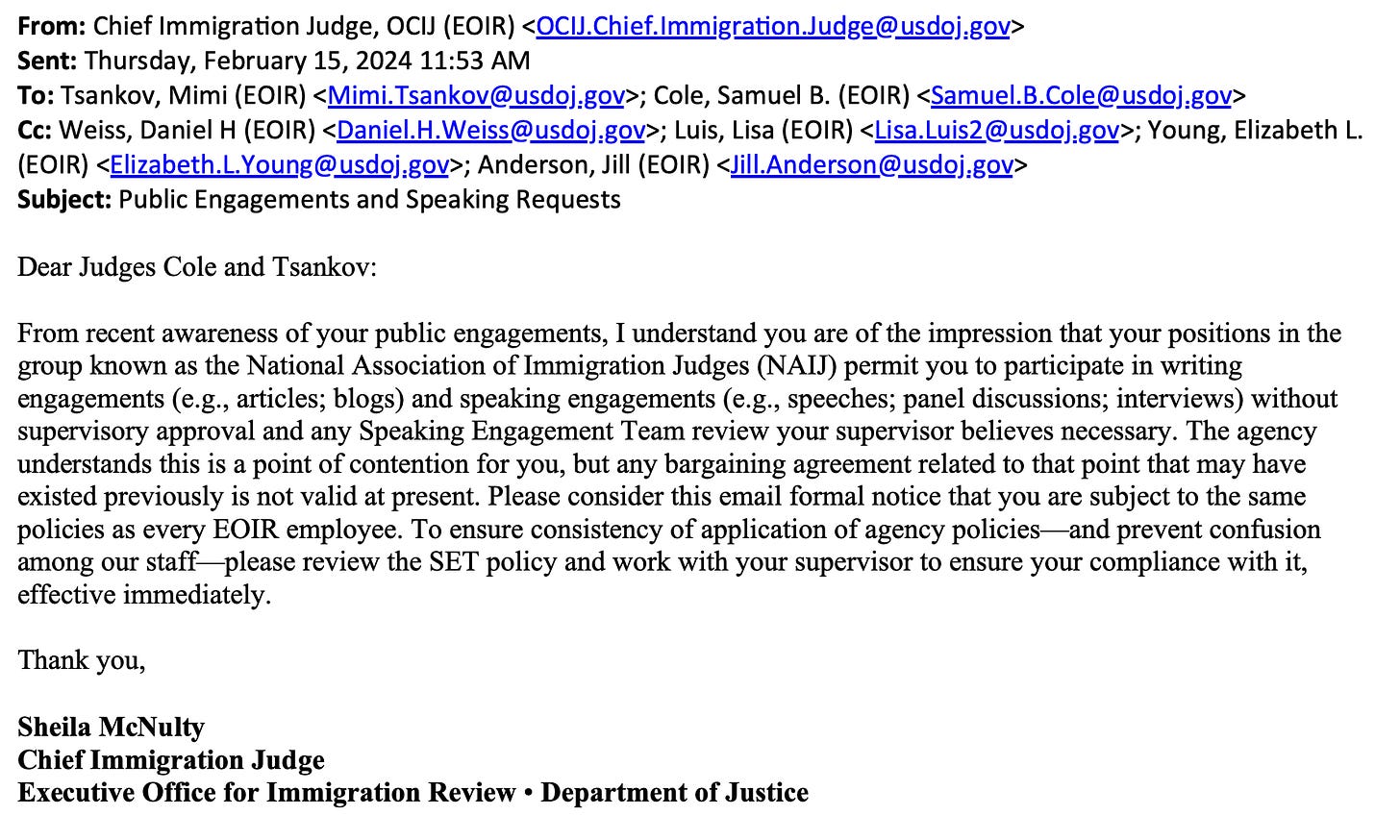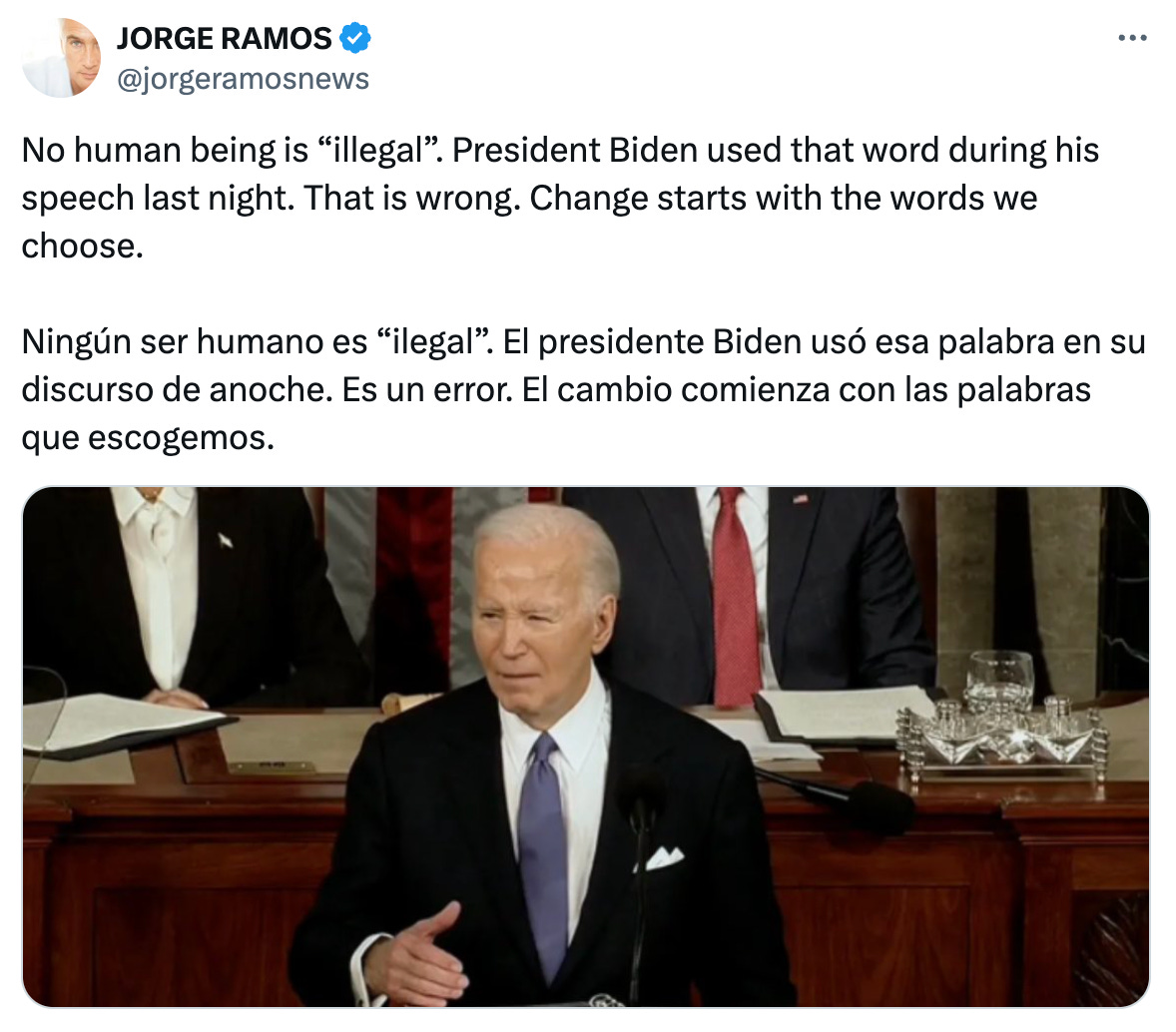Welcome back, friends. To celebrate the end of the week and the start of the weekend, I am sending you my personal list of Five Things You Might Have Missed. For this issue, I draw from my bucket of many (many) things that I read or saw during the week and share them with you.
Justice Department Silences Immigration Judges
Biden Refers to Immigrants as “Illegals”
How Does Asylum Work Right Now?
The Migrant’s Journey by Adam Isacson
Talking About Immigration in an Election Year
Welcome back. My name is Austin Kocher, and I’m a professor who writes about the fascinating world of immigration. If you’re new, welcome! 🙏🏼 You can learn more about this newsletter on the “about” page—and please consider subscribing.
Justice Department Silences Immigration Judges
Two leaders of the National Association of Immigration Judges (NAIJ)—the immigration judges’ union—were reprimanded by a Chief Immigration Judge in February for speaking in public.
The NAIJ has been around for over 50 years. In addition to representing judges’ interests, the NAIJ has also provided a mechanism for officers of the NAIJ to speak publicly outside of their official capacity. The NAIJ has been one of the most valuable sources of objective information about the demands and problems with the immigration courts, which now face a backlog of over 3,000,000 pending cases.
However, a Chief Immigration Judge at the Department of Justice sent an email to NAIJ’s leadership warning them not to speak publicly without prior approval from the agency. Many reports have referred to this as a new “gag order”.
The reprimanded judges include New York-based Judge Mimi Tsankov, who serves as NAIJ’s president, and Samuel Cole, an immigration judge in Chicago who is NAIJ’s executive vice president.
In response to the email, the IFPTE (the larger union that includes the NAIJ) issued a press release that explained the matter and included a statement from IFPTE president Matt Biggs:
“We believe that this order and un-American, anti-union act of censorship by McNulty will lead to Congressional hearings. Until this matter is resolved, the judges’ national union, IFPTE, will act as the voice for the immigration judges. McNulty may try, but the nation’s immigration judges won’t be silenced.”
As Biggs and others have pointed out, directing a “gag order” at labor representatives stands in sharp contrast to the Biden administration’s often-touted pro-labor stance.
Biden Refers to Immigrants as “Illegals”
At the State of the Union last night, Presiden Biden responded to goading from Marjorie Taylor Green by referring to recent murder victim Laken Riley as having been killed by “an illegal.”
Laken Riley, who was killed by a Venezuelan national in Georgia, has become a rallying case for Republicans who view Riley’s murder as emblematic of the failure of Biden’s immigration policies and part of a broader “immigrant crime wave”.
While the murder is tragic, it’s worth pointing out that migrants (including undocumented migrants) continue to commit violent crimes at lower rates than US citizens—not that this conversation is intended to be rational (it isn’t).
Many Republicans arrived in Congress last night with “say her name” buttons as part of a push for Biden to acknowledge Riley’s death.
They got what they wanted when Biden went off script and responded to Green by saying: “Lincoln Riley” [sic] was “An innocent young woman who was killed by an illegal. That’s right.”
Although I was not watching the SOTU, I watched as Twitter exploded in outrage at seeing the president use a term that has long been criticized as xenophobic, racist, legally inaccurate, and inflammatory.
Activists, public figures, elected representatives, and journalists—Jorge Ramos among them—immediately took to Twitter to lambast the president for the term and to tweet the phrase “No human being is illegal”.
Sidenote: many people are not aware that the original phrase “Kein mensch ist illegal” was first uttered (or at least generally attributed to) Holocaust survivor Ellie Wiesel in the 1980s.
For reference, Mary Giovagnoli wrote about this in 2012, the Associated Press dropped this term in 2013, and the Biden administration itself dropped the use of this term in 2021.
How Does Asylum Work Right Now?
The U.S. asylum system is constantly changing.
That’s why it’s so important that the public have access to up-to-date information about the asylum process—which is exactly what journalist John Washington provides in his latest article for AZ Luminaria titled “8 things to know about people seeking asylum in Arizona.”
I encourage you to click through to read the article and share it with people who want to understand more about the asylum process along the border.
By the way, if you want to meet John, he’ll be in the Baltimore area later this month to talk about his new book Open Borders at Red Emma’s Book Store. See my previous post here for more information.
The Migrant’s Journey by Adam Isacson
Following John’s article above, Adam Isacson from WOLA created this incredibly timely, data-rich video that walks you through the migration journey.
Questions addressed include:
What is new and different about the people who are coming to the border today
What is “asylum?
What are people fleeing?
What countries are they coming from?
What role did U.S. policy historically play in the conditions they’re fleeing?
What is the trip to the U.S. border like? What threats do people face?
What happens when they get to the border? How do processing, case management, and adjudication work (or fail to work)?
What has the U.S. government done to try to “push the migration numbers down?”
What would a better policy look like?
Talking About Immigration in an Election Year
Finally, I was interviewed by Frank News about key immigration issues during an election year.
You might find the interview interesting because it’s relatively unedited and unscripted. The reporter would ask me questions, let me rant for a bit, and then transcribed the entire thing.
For this reason, the interview is very conversational, even informal, and you get to “hear” more of my voice than usual. I was a little snarky in parts—it was a mood. I said things like:
To be honest, when it comes to immigration policy and Congress, including the present immigration bill, I simply don't follow it that closely. I just don't have the time to follow a legislative body that doesn't actually get anything done. So it's a lot of sound and fury at the moment.
Read the full interview on Substack here:
Support public scholarship!
Thank you for reading. If you would like to support public scholarship and receive this newsletter in your inbox, click below to subscribe for free. And if you find this information useful, consider sharing it online or with friends and colleagues.







